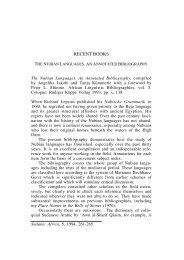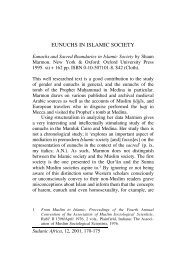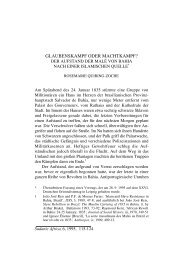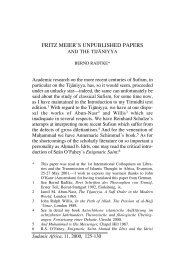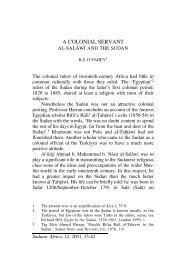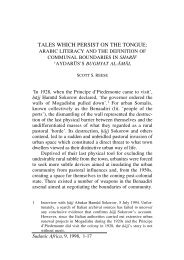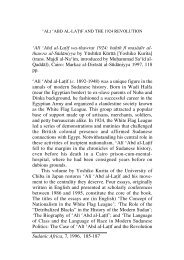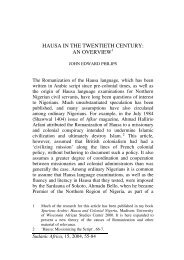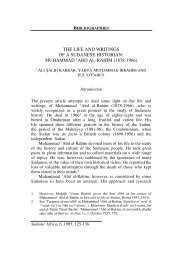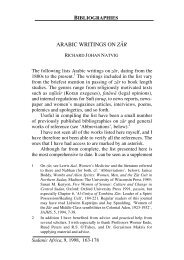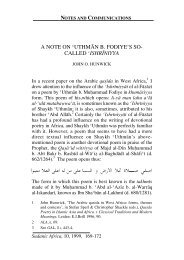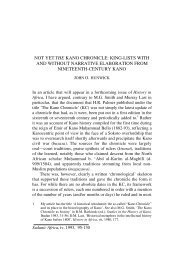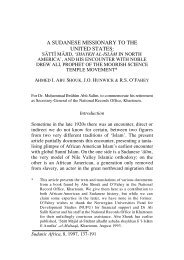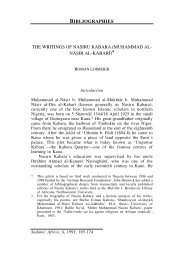640 Ziba Mir-Hosseini / <strong>Between</strong> <strong>Islamic</strong> <strong>Law</strong> <strong>and</strong> Feminismfrom the straitjacket of earlier anticolonial <strong>and</strong> nationalistdiscourses.Usingthe language of political Islam, they could sustain a critique of the genderbiases in <strong>Islamic</strong> law in ways that were previously impossible.By the late 1980s, there were clear signs of the emergence of a new consciousness,a new way of thinking, a gender discourse that was <strong>and</strong> is feministin its aspiration <strong>and</strong> dem<strong>and</strong>s, yet <strong>Islamic</strong> in its language <strong>and</strong> sourcesof legitimacy. One version of this new discourse has come to be called <strong>Islamic</strong>feminism. 19 The majority of Islamists, however, <strong>and</strong> some secularfeminists, see the notion of <strong>Islamic</strong> feminism as antithetical to their respectivepositions or ideologies <strong>and</strong> in effect as a contradiction in terms.What, then, is <strong>Islamic</strong> feminism? How does it differ from other feminisms?These questions can best be answered by examining the dynamicsof <strong>Islamic</strong> feminism <strong>and</strong> its potential in the <strong>Muslim</strong> world. It is difficult <strong>and</strong>perhaps futile to put the emerging feminist voices in Islam into neat categories<strong>and</strong> to try to generate a definition that reflects the diversity of positions<strong>and</strong> approaches of <strong>Islamic</strong> feminists. As with other feminists, theirpositions are local, diverse, multiple, <strong>and</strong> evolving. Many of them have difficultywith the label <strong>and</strong> object to being called either <strong>Islamic</strong> or feminist.They all seek gender justice <strong>and</strong> equality <strong>for</strong> women, though they do notalways agree on what constitutes justice or equality or the best ways of attainingthem.To underst<strong>and</strong> a movement that is still in <strong>for</strong>mation, we might start byconsidering who its opponents are; in other words, we might consider the19. There is a growing literature on <strong>Islamic</strong> feminism <strong>and</strong> its politics. See <strong>for</strong> instance HalehAfshar, Islam <strong>and</strong> Feminisms: An Iranian Case-Study (Basingstoke, Engl<strong>and</strong>, 1998); Badran,“<strong>Islamic</strong> Feminism: What’s in a Name?” Al-Ahram Weekly, 17 Jan. 2002, http://weekly.ahram.org.eg/2002/569/cu1.htm<strong>and</strong> “<strong>Between</strong> Secular <strong>and</strong> <strong>Islamic</strong> Feminisms: Reflections on the MiddleEast <strong>and</strong> Beyond,” Journal of Middle Eastern Women’s Studies 1 (2005): 6–28; Elizabeth Fernea, InSearch of <strong>Islamic</strong> Feminism: One Woman’s Global Journey (New York, 1998); Anouar Majid, “ThePolitics of Feminism in Islam” <strong>and</strong> Valentine Moghadam, “<strong>Islamic</strong> Feminism <strong>and</strong> Its Discontents:Toward a Resolution of the Debate,” in Gender, Politics, <strong>and</strong> Islam, ed. Therese Saliba (Chicago,2002), pp. 15–51; Mir-Hosseini, “<strong>Islamic</strong> <strong>Law</strong> <strong>and</strong> Feminism: The Story of a Relationship,”Yearbook of <strong>Islamic</strong> <strong>and</strong> Middle Eastern <strong>Law</strong> 9 (2002): 34–42; Mirza, “<strong>Islamic</strong> Feminism,Possibilities <strong>and</strong> Limitations,” in <strong>Law</strong> after Ground Zero, ed. John Strawson (London, 2002), pp.108–22; Mirza, <strong>Islamic</strong> Feminism <strong>and</strong> the <strong>Law</strong>; Najmabadi Heba Raouf Ezzat, “The Silent Ayesha:An Egyptian Narrative,” in Globalization, Gender, <strong>and</strong> Religion: The Politics of Women’s Rights inCatholic <strong>and</strong> <strong>Muslim</strong> Contexts, ed. Jane H. Bayes <strong>and</strong> Nayereh Tohidi (New York, 2001), pp. 231–57;Anne Sofie Roald, “Feminist Reinterpretation of <strong>Islamic</strong> Sources: <strong>Muslim</strong> Feminist Theology inLight of the Christian Tradition of Feminist Thought,” in Women <strong>and</strong> Islamization: ContemporaryDimensions of Discourse on Gender Relations, ed. Karen Ask <strong>and</strong> Marit Tjomsl<strong>and</strong> (Ox<strong>for</strong>d, 1998),pp. 17–44; Sa‘diyya Shaikh, “Trans<strong>for</strong>ming Feminism: Islam, Women, <strong>and</strong> Gender Justice” <strong>and</strong>Gwendolyn Zoharah Simmons, “Are We up to the Challenge? The Need <strong>for</strong> a Radical Re-orderingof the <strong>Islamic</strong> Discourse on Women,” in Progressive <strong>Muslim</strong>s: On Justice, Gender, <strong>and</strong> Pluralism, ed.Omid Safi (Ox<strong>for</strong>d, 2003), pp. 147–62, 235–48; <strong>and</strong> Tohidi, “‘<strong>Islamic</strong> Feminism’: Perils <strong>and</strong>Promises,” Mews Review 16 (Fall 2001), http://www.amews.org/review/reviewarticles/tohidi.htm
Critical Inquiry / Summer 2006 641resistance against which it has had to struggle. Opponents of the feministproject in Islam fall into three broad categories: <strong>Muslim</strong> traditionalists, <strong>Islamic</strong>fundamentalists, <strong>and</strong> secular fundamentalists. <strong>Muslim</strong> traditionalistsresist any changes to what they hold to be eternally valid ways sanctionedby an unchanging sharia. <strong>Islamic</strong> fundamentalists—a very broad category—arethose who seek to change current practices by a return to anearlier, “purer” version of the sharia. Secular fundamentalists—who can bejust as dogmatic <strong>and</strong> ideological as religious fundamentalists—deny thatany religious law or social practice can be just or equal.Though adhering to very different ideologies <strong>and</strong> scholarly traditions<strong>and</strong> following very different agendas, all these opponents of the feministproject in Islam share one thing—an essentialist <strong>and</strong> nonhistorical underst<strong>and</strong>ingof Islam <strong>and</strong> <strong>Islamic</strong> law. They fail to recognize that assumptions<strong>and</strong> laws about gender in Islam—as in any other religion—are socially constructed<strong>and</strong> thus historically changing <strong>and</strong> open to negotiation. They resistreadings of <strong>Islamic</strong> law that treat it like any other system of law <strong>and</strong> disguisetheir resistance by mystification <strong>and</strong> misrepresentation. Selective in theirarguments <strong>and</strong> illustrations, the three kinds of opponents resort to thesamekinds of sophistry; <strong>for</strong> example, they seek to close discussion by producingKoranic verses or Traditions (hadith) taken out of context. <strong>Muslim</strong> traditionalists<strong>and</strong> <strong>Islamic</strong> fundamentalists do this as a means of silencing otherinternal voices <strong>and</strong> abuse the authority of the text <strong>for</strong> authoritarian purposes.Secular fundamentalists do the same, but in the name of enlightenment,progress, <strong>and</strong> science—<strong>and</strong> as a means of showing the misogynyof Islam—while ignoring the contexts in which the texts were produced, aswell as the existence of alternative texts. In so doing, they end up essentializing<strong>and</strong> perpetuating difference <strong>and</strong> reproduce a crude version of theOrientalist narrative of Islam. 20What is often missing in these narratives is a recognition that genderinequality in the old world was assumed <strong>and</strong> that perceptions of women inChristian <strong>and</strong> Jewish texts are not that different from those of <strong>Islamic</strong> texts.The early Western feminists too found it necessary to confront <strong>and</strong> challengethese perceptions, <strong>and</strong> they did so not by rejecting the Bible or theirfaith but by appealing to its higher values <strong>and</strong> principles. In the eighteenthcentury, Mary Wollstonecraft in A Vindication of the Rights of Woman (1792)often referred to biblical passages when defending women’s essential equalitywith men <strong>and</strong> in refuting the enlightenment philosophers’ argumentson women’s nature as essentially different from men’s. A century later, Eliz-20. See Haideh Moghissi, Feminism <strong>and</strong> <strong>Islamic</strong> Fundamentalism: The Limits of PostmodernAnalysis (London, 1999).



